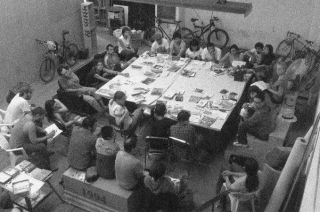UNIDEE Modules spring/summer 2021: Groundwork for Embedded Arts Practice | open call & selected residents
UNIDEE and Cittadellarte-Fondazione Pistoletto are pleased to invite applications for participation in this year’s UNIDEE Residency programs.
Curated by Andy Abbott, the theme is "Groundwork for Embedded Arts Practice".
In 2020 more than 40 international participants took part in the UNIDEE residency programme exploring ‘what’s next?’ for embedded arts practice in a post-pandemic future.
The 2021 program aims to further and deepen this conversation with a specific focus on alternative structures, frameworks, ecologies and organisational forms for socially engaged art projects, and the ‘groundwork’ required to build and sustain them. How are artists and artworkers laying the foundations for new realities through creative approaches to collaboration, exchange, economy, labour, policy, pedagogy and networks? How essential is this infrastructure to the success of socially transformative art projects? In what spaces, places and contexts can it emerge and grow? To what extent can we consider its development a part of the practice, and how can we maintain it together? .
The residency is an opportunity to collectively and collaboratively address these questions through the sharing and reflection of ongoing practice and practice-led research. Over ten weeks from May to July 2021, the residency will provide a forum for practitioners from a range of backgrounds to gain new perspective and develop their practice through a programme of peer-to-peer learning.
Read the UNIDEE 2021 program Curatorial Statement here
In order to accommodate global social distancing measures and travel restrictions the bulk of the residency will be delivered accessed remotely, with an option to undertake your one-week intensive in Cittadellarte-Fondazione Pistoletto, Biella (Northern Italy) for those able and willing to travel.
Participants will bring their ongoing practice, research or project to the residency to share and develop over the ten weeks. The development of your project will be facilitated by a programme of peer-to-peer learning including group critiques, seminars, meetings/visits and collective exhibition and publication, facilitated by the UNIDEE team.
Participants will also benefit from perspectives, workshops, and mentoring opportunities from guest practitioners, curators, collectives, arts organisers and academics. Invited guests and case studies include economic geographer and co-author of Take Back the Economy: An Ethical Guide for Transforming Our Communities Professor Katherine Gibson (Australia); artist Jeanne van Heeswijk (the Netherlands); community economies platform The Interdependence (artists Kathrin Böhm, Kate Rich, Bianca Elzembauer) with researcher and curator Aria Spinelli; Decentralising Political Economies (presented by researcher/curator Alessandra Saviotti and artist Owen Griffiths); artist, academic and curator of the feminist DIY virtual collective Ladyz in Noyz Marlo De Lara (USA); nomadic postcapitalist think-tank Institute of Radical Imagination (represented by artists and academics Massimiliano Mollona, Marco Baravalle and Emanuele Braga), Mexico City-based collective Cráter Invertido (Mexico), Wharf Chambers Co-operative Club (UK) – a worker’s co-op run cultural venue in Leeds; Pyramid, a collective of around 150 artists with and without learning disabilities and artist-facilitator, museum professional and academic Jade French (UK); and artist, activist, and author of Art as Social Action and Dark Matter Gregory Sholette (USA).
The programme will also include workshops and discussions with organisations in Cittadellarte and Biella including Let.Eat.Bi, Art of Demopraxy, Cittadellarte Fashion B.E.S.T., Hydro, Learning Environment, Visible Project, PACE Futuro.
We envisage a cohort of up to thirty participants from a range of backgrounds and with diverse practices in the area of socially engaged art and social practice, curatorial practice, and community-organization. Participants will have an emerging or developing practice – either as an individual or as representative of an organisation or institution – that they wish to develop during the residency via an ongoing project or action research. Experience need not necessarily relate to an institution or formal education. We particularly welcome applications from those who will bring under-represented voices and perspectives to the cohort.
For the bulk of the residency you will work and develop your ongoing project/action research independently and take part in weekly webinars on Saturdays (aside from in the two week break in June). Whilst we do not expect a predetermined or final outcome from your project you will be asked to give regular updates and share a ‘trace’ or ‘mark’ of the project at various points across the residency (using an online platform). As such you are expected to be regularly capturing or producing shareable material as part of your process.
Participants will need to be able to engage with the full ten weeks of the program that will take place between May 1st and July 10th 2021, and commit to a ‘one-week intensive’ in this period. The one-week intensive is an opportunity to focus, unpack, develop and share your project with others. It runs from Monday to Monday and participants wishing to undertake the intensive at Cittadellarte must arrive in Biella the Sunday and leave on Tuesday so as to allow for an overlap day with the subsequent group when applicable.
During your one-week intensive you will be expected to take part in daily seminars, group critiques, one-to-ones and other organised activities. We will endeavour to schedule these sessions to allow for remote engagement from other timezones but you may be required to take part in some early mornings or evenings. You will also be expected to use the one-week intensive to connect with the rest of your group for ‘informal learning’ and self-organised activities.
The ten slots for the one-week intensive in Biella are:
• May 3rd – 10th
• May10th - 17th
• May 17th – 24th
• May 24th – 30th
--- Two week programme break for independent research ---
• June 14th – 21st
• June 21st – 28th
• June 28th – July 4th
In your application you will be asked to let us know if there are any weeks you can definitely not do your one-week intensive (either online or in presence in Biella) as well as any week for which you have a preference. The program will be delivered in English and participants should be fluent speakers.
Bursaries and scholarships are available to cover the full €1500 fee for the program and, for those that choose to spend their one-week intensive in presence, accommodation whilst in Biella. Participants will be required to cover their own travel to/from Biella and food/living costs whilst in Cittadellarte..
Application is by Expression of Interest by filling out the application form with the following requirement:
• Indicate the weeks of preference of the one-week intensive (from Monday to Monday).
• Up to 150 words about yourself and your practice and/or experience, and your suitability for the residency.*
• Up to 200 words about the ongoing project or research that you will share and develop as part of the residency including details about the local context (place, communities, audiences) and what long-term change you could hope to facilitate. Please note the project does not necessarily need to be already established and there is no expectation that it should have a pre-defined or final output in the time of residency. We do however wish to mark and trace the development and the progress of the project through the residency, and ground the learning in your practice. As such the project should be ready to move beyond the ‘idea’ stage and into testing and application at the start of the residency.
• Up to 150 words about the network or ecosystem you feel your practice is part of and how you would like to investigate, develop and/or expand this through the residency.
• and a CV / Portfolio in PDF format.
Total weight of attachments in one email: max 6mb.
*Please state if you would like to be considered for a bursary to subsidise the residency fee.
Applicants must submit their application by email to: unidee@cittadellarte.it stating: “UNIDEE 2021 residency application (your name)” as a subject line.
Deadline for submissions is April 5th, 5pm and we will let successful applicants know a decision by April 9th.
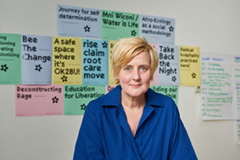
JEANNE VAN HEESWIJK
Jeanne van Heeswijk is an artist who facilitates the creation of dynamic and diversified public spaces in order to “radicalize the local”. Her long-scale community-embedded projects question art’s autonomy by combining performative actions, discussions, and other forms of organizing and pedagogy in order to assist communities to take control of their own futures.
MASSIMILIANO (MAO) MOLLONA / INSTITUTE OF RADICAL IMAGINATION WITH MARCO BARAVALLE AND EMANUELE BRAGA
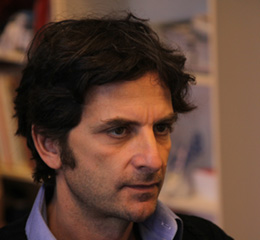
Massimiliano (Mao) Mollona is a writer, filmmaker and anthropologist. He is senior Lecturer in the Department of Anthropology, at Goldsmiths College, London. He has a multidisciplinary background in economics and anthropology and his work focuses on the relationship between art and political economy. He conducted extensive fieldwork in Italy, the UK, Brazil and Norway, looking at the relationship between economic development and political activism through participatory and experimental film practices in favelas and poor neighborhoods. His practice is situated at the intersection of pedagogy, art and activism. He is a member of the collective freethought, Programme Director of the Athens Biennale 2015–2017, and editor of Focaal Anthropology and Visual Anthropology (AVA) Blog.
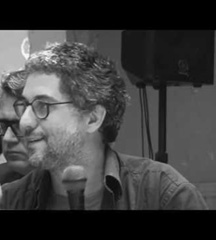
Emanuele Braga is an artist, researcher and activist, operating on the relationship between art, economy, and new technologies. In the past years he co-founded and developed several projects as Balletto Civile dance company in which he operated as a choreographer, performer and teacher, Macao, new centre for art and culture in Milano, Landscape Choreography cross-sectors, performative and research project, in which he operated as director, curator and researcher, IRI Institute of Radical Imagination, transnational artistic think tank questioning postcapitalism alternative, Ebony decolonize work, design platform for asylum seekers, and KIN lab, an art space in Milano.
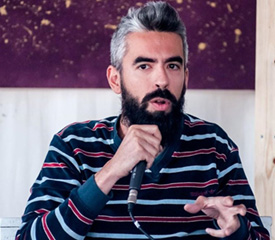
Marco Baravalle is a member of S.a.L.E. Docks, a collective and an independent space for visual arts, activism, and experimental theatre located in what had been an abandoned salt-storage facility in Dorsoduro, Venice, Italy. Founded in 2007, its programming includes activist-group meetings, formal exhibitions, and screenings. Baravalle is a research fellow at INCOMMON. In praise of community. Shared creativity in arts and politics in Italy (1959-1979), a project hosted by IUAV, University of Venice. He is a member of IRI (Institute Of Radical Imagination), a think-tank inviting political scientists, economists, lawyers, architects, hackers, activists, artists and cultural producers to share knowledge on a continuous base with the aim of defining and implementing zones of post-capitalism in Europe’s South and the Mediterranean.
DECENTRALISING POLITICAL ECONOMIES (PRESENTED BY RESEARCHER/CURATOR ALESSANDRA SAVIOTTI AND ARTIST OWEN GRIFFITHS)
A new platform conceived as an open-source environment to understand and re-think how art can be used as a tool for social, economic and political change. dpe.tools is developed by the Whitworth (Manchester, UK); Liverpool John Moores University’s School of Art and Design; and The Association of Arte Útil.
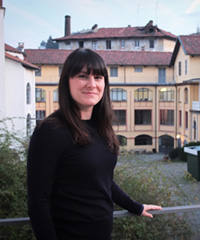
Alessandra Saviotti is a curator and educator who lives in Amsterdam. She is a PhD researcher at the Liverpool John Moores University - School of Art and Design.
Her focus is on socially engaged art, collaborative practices and Arte Útil. She is currently busy researching how alternative education models framed as Arte Útil could be successfully implemented within the institution of education fostering sustainability, hacking the institution itself.
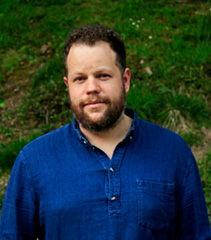
Owen Griffiths is an artist, workshop leader and facilitator living and working in Wales. Using participatory and collaborative processes, his socially engaged practice explores the possibilities of art to create new frameworks and resources. This takes many forms, including events, rituals, dialogues, making gardens, codesigning spaces, curating events and cooking feasts. Griffiths explores climate, landscape, urbanism, social justice, food systems and pedagogy, creating projects and events that prepare us for the work of the future.
In 2020 Griffiths founded Ways of Working, a social enterprise in order to work in ways he feels are urgent. Ways of Working is currently developing several community urban green spaces in collaboration with local communities, questioning how civic spaces are planned, made and owned. Griffiths graduated from the School of Walls and Space at the Royal Danish Academy of Fine Arts in Copenhagen and is a member of the Social Sculpture Research Unit at Oxford Brookes University. He is part of the DPE research project at Manchester Whitworth Gallery and the City Lab at John Moores University.
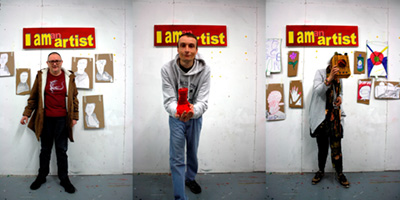
PYRAMID (JAMES HILL) AND DR JADE FRENCH
Pyramid invests in people with learning disabilities so that they can discover the arts, develop as artists and disrupt the barriers that prevent artists with learning disabilities from progressing. Pyramid is a collective of around 150 artists with and without learning disabilities who work together to explore and develop their creativity and to make great art for a wide public. Pyramid recognises that all artists need support networks and infrastructure, but that artists with learning disabilities need particular support that is often missing. We strive to provide that support.
James Hill has been Director of Pyramid since 2013. Prior to that he worked on Leeds City Council’s Arts & Regeneration Team setting up and managing arts events. In 2013 he completed an MA in Activism and Social Change at the University of Leeds.
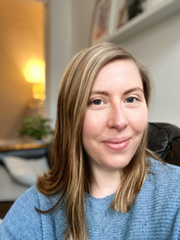
Jade French is an artist-facilitator, museum professional and academic whose research interests emerge from practical experience of facilitating inclusive and community-led projects in museums, galleries and heritage sites.
https://pyramid.org.uk/
https://ccsmgh.leeds.ac.uk/research/irregular-art-schools/
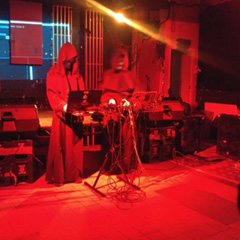
WHARF CHAMBERS CO-OPERATIVE CLUB
Wharf Chambers is a not-for-profit multi-use venue in Leeds City Centre. Set up in 2011 as workers coop and artist-centred space, it provides space for music, art, film, politics and discussion that brings together people from communities across Leeds.
An important venue in UK DIY music culture, it actively encourage ‘trying things out’ without commercial expectations. Whether a performance is classical, avant-garde, electronica or noise, their audiences expect to be challenged.
Inclusivity and affordability are it’s core principles and Wharf Chambers creates a community who pride themselves in collaboration and self-organisation.
THE INTERDEPENDENCE (KATHRIN BÖHM, KATE RICH, BIANCA ELZEMBAUER) IN CONVERSATION WITH ARIA SPINELLI
A platform to make visible and support people and organisations who are practising community economies worldwide and wish to signal their alliance with a larger movement to create economies that have the well-being of people and the planet at their core. Artists involved in the alliance will discuss their projects in conversation with researcher and curator Aria Spinelli.
www.communityeconomies.org/index.php/interdependence
https://companydrinks.info/whats-on/economy/
https://feraltrade.org/statement/
www.brave-new-alps.com
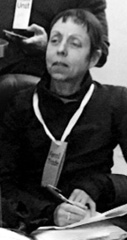
Kate Rich is a trade artist and feral economist. Since 2003 she has run Feral Trade, a long-range economic experiment and underground freight network, utilising the spare carrying capacity of the art world for the transportation of groceries. Kate is volunteer finance manager at Bristol's artist-run Cube Microplex, system administrator for the Irational.org art-server collective, satellite member of the FoAM network of transdisciplinary labs and land-based member of the Sail Cargo Alliance. She is currently trialling the curriculum for the Feral MBA, a radically different kind of training course in business for artists and others.
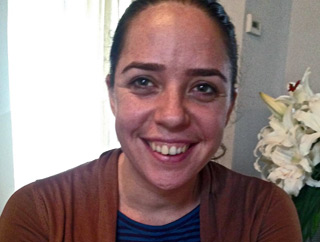
Aria Spinelli is an independent curator and researcher, currently a Lecturer at NABA - New Academy of Fine Arts in Rome. She is a PhD student at Loughborough University with a project on relations of curatorial practice to social imagination and performativity. Her main area of research is the investigation of the relationship between art, activism and political theory. She holds a bachelor's and master's degree in art history, visual arts and curatorial studies. Founding member of the artistic and curatorial collective Radical Intention, from 2018 to 2020 she was associate researcher and member of the curatorial team of the project The Independent at the MAXXI - Museum of the XXI century for art (Rome). Between 2014 and 2018 she collaborated as external curator at the Pistoletto Foundation (Biella) and BOZAR, Center for Fine Arts (Brussels). She is the editor of the publication 'Shaping Desired Futures' (NERO, 2018). Between 2009 and 2012 she was curator at the Isola Art Center (Milan).
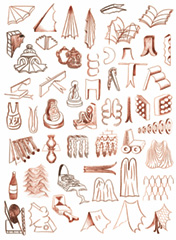
CRÁTER INVERTIDO
Cooperativa Cráter Invertido is a Mexico City-based collective born in 2011 and part of Arts Collaboratory from 2014.
Composed of shifting numbers of members educated in visual arts and free media, they are the space that brings together art practices and collective processes to create a common imaginary.
The multidisciplinary projects held by Crater are crossing through dimensions of self publishing, both radio and riso printed; self organization, self learning and collective imaginary process, sharing tools and knowledge, as well as participating in the independent editorial network in Mexico.
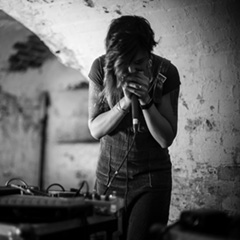
MARLO DE LARA
Born in Baltimore, Maryland,USA, artist Marlo De Lara received a PhD at the University of Leeds and an MA in Psychosocial Studies at the Centre of Psychoanalytic Studies at Essex. Her practice works within the realms of sound performance, visual distraction, and film. Often under the moniker ‘marlo eggplant’, her textural compositions develop from microscopic tone landscapes into dense and expansive states of noise. Her works aim to blur the definitions of the (un)intentional and the myth of permanence. Using found objects, installation, and various forms of amplification, environments/structures use sound to impart meaning and affect for the participant. As the child of Filipino migrants of the ‘brain drain’ coming of age, De Lara’s unabashed feminist sociopolitical practice/research editorializes on contemporary global conditions. Her investigations on art collectives and creative work as political action fuels Ladyz in Noyz, an international arts collective that promotes emerging artists/musicians who are women.
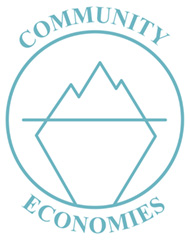
KATHERINE GIBSON
Katherine Gibson - economic geographer with an international reputation for innovative research on economic transformation and over 30 years’ experience of working with communities to build resilient economies. As J.K. Gibson-Graham, the collective authorial presence she shares with the late Julie Graham (Professor of Geography, University of Massachusetts Amherst), her books include The End of Capitalism (As We Knew It): A Feminist Critique of Political Economy (Blackwell 1996), A Postcapitalist Politics (University of Minnesota Press, 2006) and Take Back the Economy: An Ethical Guide for Transforming Our Communities, co-authored with Jenny Cameron and Stephen Healy (University of Minnesota Press, 2013) and The Handbook of Diverse Economies co-edited with Kelly Dombroski (Edward Elgar, 2020).
www.westernsydney.edu.au/ics/people/researchers/katherine_gibson
GREG SHOLETTE
Gregory Sholette is an artist, activist, writer, curator of the mobile project Imaginary Archive: (a collection of documents about the past whose future never arrived). He is Professor at Queens College, City University of New York, where he co-directs the Social Practice art program with Chloë Bass, and he is a founding member of the collectives, Political Art Documentation/Distribution (1980–88), REPOhistory (1989–2000), and Gulf Labor Coalition (2010–). Sholette attended the Whitney Independent Studies Program, New York (1996); University of Amsterdam (PhD: 2017); University of California, San Diego (MFA: 1995); and Cooper Union, New York (BFA: 1979). He is author of The Art of Activism and the Activism of Art, (Lund Humprhies, forthcoming 2021); Art as Social Action with Chloë Bass (Allworth Press, 2018); Delirium and Resistance: Activist Art and the Crisis of Capitalism (Pluto Press, 2017); Dark Matter (Pluto Press, 2010); Collectivism After Modernism with Blake Stimson (2007); The Interventionists with Nato Thompson (MIT 2004).
2. Company Drinks, Kathrin Böhm / Myvillages
3. module "CLIMAVORE: Losing Cultures" by Cooking Sections, UNIDEE 2019
4. still from the movie made by Crater Invertido ¨Vacaciones Permanentes¨ for Biennale of Gwandju, 2016
5. Treherbet Community Feast - exploring alternative land ownership and energy models.
Owen Griffiths & Skyline for Peak Art in the black mountains
6. Company Drinks, Kathrin Böhm / Myvillages
